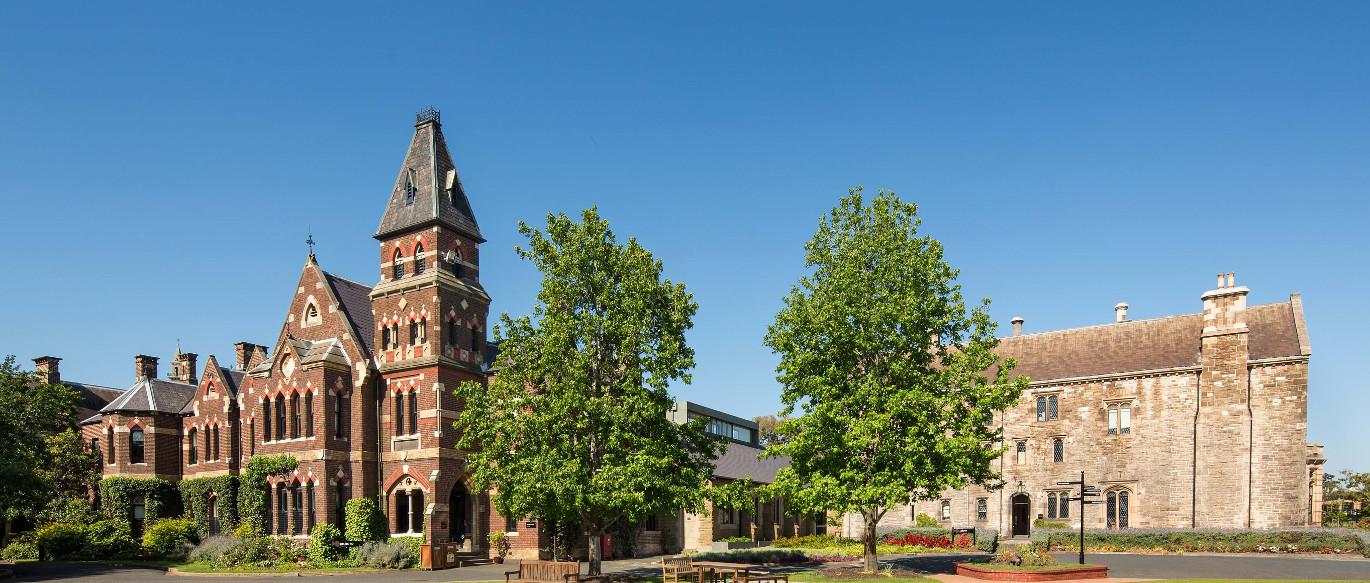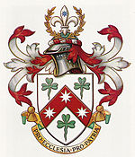Trinity College: Difference between revisions
| Line 17: | Line 17: | ||
Since 2001, Trinity has also offered summer school programs to high school age students from around Australia and internationally. In 2010 the college hosted its first Juilliard Winter Jazz School, which was repeated in 2011. These short courses form the core of the Trinity Institute. | Since 2001, Trinity has also offered summer school programs to high school age students from around Australia and internationally. In 2010 the college hosted its first Juilliard Winter Jazz School, which was repeated in 2011. These short courses form the core of the Trinity Institute. | ||
== Architecture and Main Buildings == | |||
Situated to the north of the main university campus, Trinity's various ivy-clad stone and brick buildings surround a large grassed area, known as the Bulpadock. | |||
;The college's main buildings include -- | |||
:1870-2: Leeper Building (formerly the Provost's Lodge) | |||
:1878: Bishops' Building (named after Charles Perry and James Moorhouse, the first and second Bishops of Melbourne) | |||
:1880: Dining Hall | |||
:1883–87: Clarke's Building | |||
:1914–17: Horsfall Chapel | |||
:1933: Behan Building (named after John Clifford Valentine Behan, a former warden) | |||
:1958: Memorial Building (commonly called "Jeopardy") | |||
:1963–65: Cowan Building (named after Ronald Cowan, a former warden) | |||
:1995–96: Evan Burge Building (Library) | |||
:2006–07: Gourlay Building ("Woodheap") | |||
:2014– : The Gateway Building (under construction) | |||
Revision as of 13:59, 13 March 2016
Introduction
Trinity College is the oldest residential college of the University of Melbourne. Founded in 1872 on a site granted to the Church of England for the university, Trinity is unique among Australian university colleges in the scope of its educational programs. In addition to its resident community of 300 University of Melbourne and University of Divinity students, Trinity's programs includes Trinity College Foundation Studies, which prepares around 1000 international students for admission to the University of Melbourne annually; the Trinity College Theological School, an Anglican theological college, now a college of the University of Divinity; and the Trinity Institute, which runs summer and winter schools for young leaders, as well as other shorter learning and leadership programs.
Coat of Arms
History
Trinity College was founded in 1872 by the first Anglican Bishop of Melbourne, Charles Perry. The college was affiliated with the University of Melbourne in 1876. The Trinity College Theological School was founded by Bishop James Moorhouse in 1877.
In 1883 the college became the first university college in Australia to admit women when Lilian Helen Alexander was accepted as a non-resident student. With the establishment of the Trinity Women's Hostel (which later became Janet Clarke Hall) in 1886, Trinity admitted women as resident students, making it the first university college in Australia to do so.
In 1989 the Trinity Education Centre, later renamed Trinity College Foundation Studies, was established to prepare international students for entry to the University of Melbourne. In 2011 Trinity commenced operating Edith Head Hall, formerly a hostel run by the Girls Friendly Society, as a collegiate hostel for students of its Foundation Studies program.
Since 2001, Trinity has also offered summer school programs to high school age students from around Australia and internationally. In 2010 the college hosted its first Juilliard Winter Jazz School, which was repeated in 2011. These short courses form the core of the Trinity Institute.
Architecture and Main Buildings
Situated to the north of the main university campus, Trinity's various ivy-clad stone and brick buildings surround a large grassed area, known as the Bulpadock.
- The college's main buildings include --
- 1870-2: Leeper Building (formerly the Provost's Lodge)
- 1878: Bishops' Building (named after Charles Perry and James Moorhouse, the first and second Bishops of Melbourne)
- 1880: Dining Hall
- 1883–87: Clarke's Building
- 1914–17: Horsfall Chapel
- 1933: Behan Building (named after John Clifford Valentine Behan, a former warden)
- 1958: Memorial Building (commonly called "Jeopardy")
- 1963–65: Cowan Building (named after Ronald Cowan, a former warden)
- 1995–96: Evan Burge Building (Library)
- 2006–07: Gourlay Building ("Woodheap")
- 2014– : The Gateway Building (under construction)

